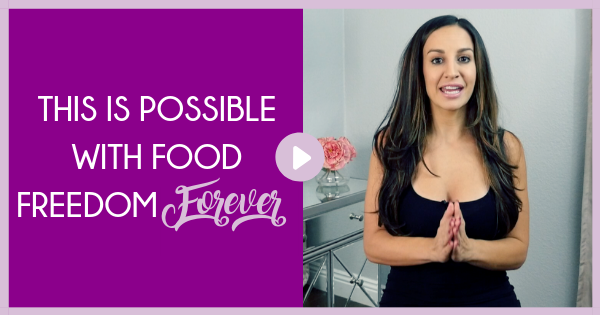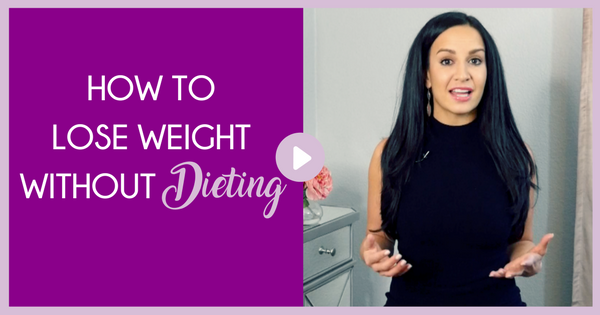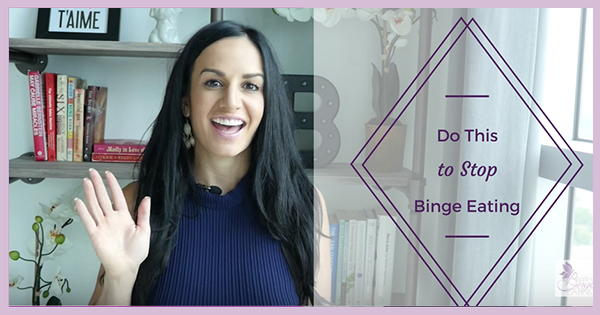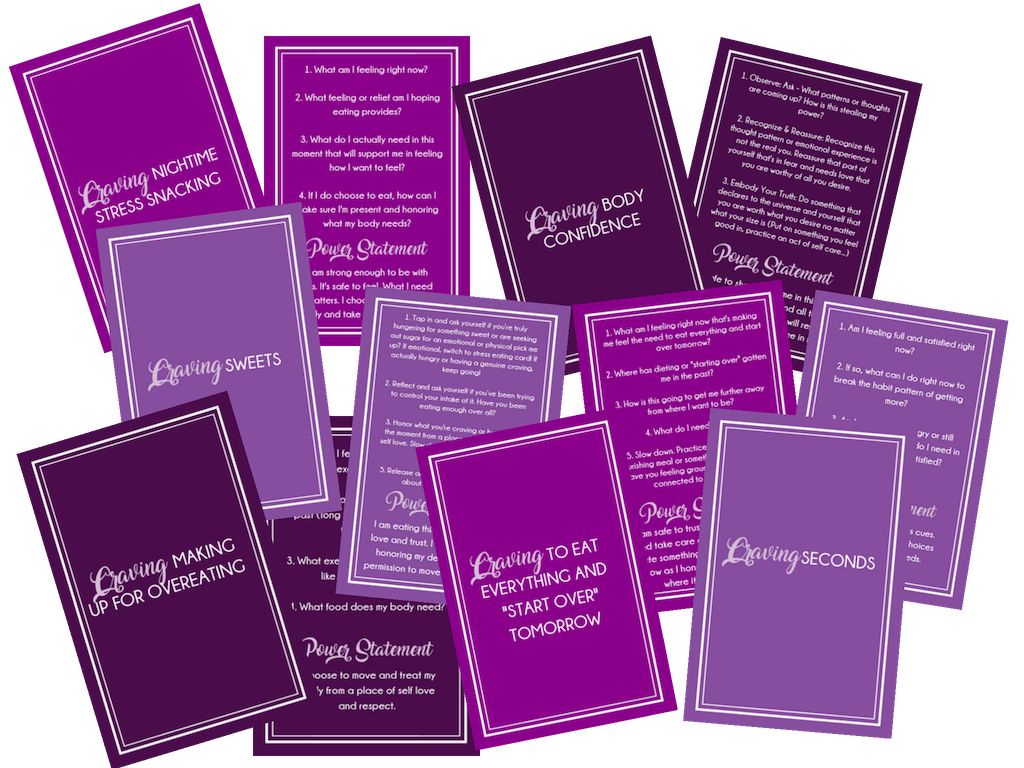If you’re Keto diet devotee, brace yourself. You might not like what I’m going to say.
But after helping thousands of women free themselves from food struggles, I believe it’s time to get real about this trendy eating plan.
The Keto Diet is everywhere, and there’s a good reason for why it sells so well.
It seems like a logical plan. It’s got science behind it. It’s got millions of devoted followers who swear that it’s magic and praise it like gospel. And I admit, it does give pretty impressive immediate results.
But here’s the question: does it work over the long haul?
I’m going to answer that question, along with a few reasons why Keto is not all it’s cracked up to be.
In this post I’ll share what happens after you get that initial burst of weight loss success–and why that success only lasts so long.
Watch the video below and learn why Keto is more wishful thinking than miracle cure — and what to do instead of living off having to live restricted from carbohydrates to get the lasting weight loss you want!
–
–
What is the Keto Diet?
If you’ve never heard of it, the Keto Diet is pretty much a repurposed version of the Atkins Diet.
Long story short, it’s a low-carb diet. Hardly anything new, since low-carb has been with us in one form or another for decades.
Here’s the bottom line with Keto: you’re allowed to eat about 20-50 grams of carbs a day, depending on your activity level. The rest of the allowable foods are pretty much protein and fat based, and high fiber non starchy vegetables (for some people there is even a restriction here).
Now, there is some legit science behind the Keto diet. I’m not denying that. I’m going to cover the theory of it right here.
The theory is that if you stop eating carbohydrates, your body doesn’t have surges of glucose, which decreases surges of insulin rushing in. Insulin is thought of the “storage” hormone. So the theory is, less insulin = less fat storage.
Also, after being in full ketosis, your body starts using fat as its fuel source. Your breath also begins to smell like shit too. Fun fun.
It sounds great in theory (minus the keto smell). In practice, it does produce quick results that are pretty motivating. In the short run, that is.
But what happens after a few weeks or a few months of extreme carb cutting?
From what I see in with the thousands of people (experts in the field included) that I’ve worked closely with, the plan hurts more than it helps. The long-term effects don’t justify the short-term results.
Now, in all fairness, Keto does provide some legitimate health benefits to people with specific medical conditions.
If someone has diabetes or insulin-related issues, for acute issues, a keto diet could be supportive (that is, if it doesn’t lead someone to binge eating on carbs, which nearly always happens).
If someone has a neurological condition like Alzheimer’s, dementia, or seizures, the Keto diet can induce specific and beneficial neurochemicals, too.
Of course, at this point, I have to throw in a disclaimer…
If you have a medical condition, don’t listen to me over your doctor. I am not dispensing medical advice. I’m not telling to either start or stop the Keto diet based on any medical condition that you may or may not have. Just so we’re clear.
And I will say this…
With all of our clients that have tried this and everyone I know who has done it, the Keto diet makes all the promises. But in the long term, it doesn’t deliver.
Here’s a breakdown of what happens when you jump on the Keto bandwagon…
You sign up for that 72-hour keto reboot, challenge, or whatever fancy name it has. You follow the plan, and start cutting carbs like there’s no tomorrow.
Suddenly you feel lighter. Less bloated. The scale says you’ve dropped 5, 10, 15 pounds. You get that mystical feeling that you’ve found a unicorn in a world of useless diets, and you’re as happy as the emoji with the heart-shaped eyes.
But there’s a reason why the weight falls off your body so effortlessly in the beginning. Unfortunately, it’s not exactly magical.
Here’s what happens…
Carbohydrates normally hold water in your body. When you stop eating those carbs, your body releases that water. So most of the rapid weight loss has nothing to do with fat burning. It’s pretty much water loss, and not much else.
Then, reality sets in. Four things happen that pretty much ruin your chances for lasting weight loss success.
Keto Fail #1: Food-focused thoughts trigger cravings (and survival mode). Keto rules out a lot of foods. That means there’s a ton of focus on which foods are allowed and which are not.
It also means that you think more about food, crave the things you can’t have, and eventually fall off the food wagon.
Many people claim that the Keto diet has cured their cravings.
But here’s my question: For how long?
Are you able to fully live your life? Or are you in the kitchen obsessively making concoctions to keep your cravings at bay?
Maybe it knocks out your cravings for a week or a month. But as a lifestyle plan, the sustainability factor is always the biggest question mark.
For nearly everyone who tries Keto, it will trigger the brain into a survival mode that drives you to lose control on food or carbs when you do allow them.
And no, this is not because you are addicted, it’s because you’ve restricted them so long that when you have them the brain says: GIVE ME MORE. Then chemically rewards you for it!
Keto Fail #2: Food becomes your life. Nearly all of the Keto followers I know have one thing in common: food is a huge focus in their lives.
That Keto diet hypnosis takes over. Keto devotees think about food a lot. They talk about food a lot. Food becomes the centerpiece of their conversations, thoughts, and activities.
They have to prep food and recipes to feel satiated. It’s a lot to think about!
Now, I have a lot of interests and passions. There are a million things I’d love to talk about other than which vegetable is the most Keto friendly. Or how many carbs my new protein shake has. Or how I’m back in ketosis again after a food bender weekend.
So, what happens when the cool pinterest keto creations aren’t cutting it anymore?
Are you willing to forever limit your restaurant choices to “allowable” options instead of just having some apps with your friends or fam?
Will you want to keep up the extreme carb-cutting indefinitely?
If that’s a heartfelt YES for you, then Keto might be your jam. But for most of us, that’s a NO.
Be real about how you want to live your life long-term.
And be honest with yourself about what the Keto diet demands–and if you’re willing to live with the rules indefinitely (if they even work, because most of the times they do not forever).
Keto Fail #3: Cutting out essential nutrients for your well-being. Keto requires that you drop food groups that are vital for your well-being. But the more “bad” stuff you cut from your diet, the more likely you’re you’ll inadvertently cut out something good. That’s especially the case with fruits and veggies.
Some are higher in carbs, which automatically puts them on the NO list in Keto world. Cut them out and you’ll reduce your carbohydrates. But you’ll also lose a lot of target phytonutrients that support your health.
When your body is missing something it needs, it triggers cravings in hopes of replacing what it lost. That means more food-focused thoughts, more out-of-control eating, and more potential weight gain rather than weight loss.
Not the point of the diet, right?
Keto Fail #4: The painful withdrawal (and weight gain that happens when you stop). You go for weeks, maybe months capping your carbs at 20-50 grams a day. What happens when you ultimately give up and try to go back to a normal diet?
Your body latches onto the carbs it’s been craving. Your body retains extra water along with all those carbs. You end up feeling bloated, exhausted, and miserable. (Not to mention packing back on the weight you lost…)
For some, the carb consumption gets out of control.
This is especially disappointing if you started Keto to help curb binge eating.
Keto makes a lot of promises, even that it can help you take control with binging. But by the time you realize that it’s an unsustainable long-term plan and you try to come off of it, it’s too late.
You can’t prevent the massive withdrawal symptoms. You’re left feeling physically miserable and even more out of control with food than you started.
Bottom line? The Keto diet and a balanced relationship with food can’t live in the same place at the same time. In the end it’s an ineffective way to stop binge eating.
In summary…
I could list many more nuanced reasons why Keto fails, but I bet you get the idea. It’s a great idea in theory that just can’t go the distance in practice.
In my experience, the Keto diet and all the other low-carb wannabe plans are simply band-aids. They’re a short-term fix that can turn into a long-term fail.
Here at Beating Binge Eating, though, we’re all about long-term sustainability and freedom with your food.
Genuine, lasting freedom with your body and your food requires more than a band-aid. If this is what you want over the long haul, Keto is not the answer.
Now, if you’re convinced that the latest low-carb diet feels like freedom to you, I’m not going to tell you that you’re wrong.
But think of it this way. If you’re living under strict food rules and restrictions, does that feel actually feel like freedom?
If you beat yourself all day because you can’t stick to a diet: that’s not freedom.
If your diet makes you think about food so much that you ultimately snap and go on a gorge-fest: that’s not freedom.
Not the way we define freedom, anyway!
There is a pathway to food freedom that has nothing to do with cutting carbs, keeping food journals, or forever obsessing over your next meal.
If you need any support in this area, we are here for you!
Click the image below where I’ve got a special gift for you! We call them, “Craving Cards”, and they’re one of our most popular tools!
If you ever feel night time cravings, sugar cravings, the urge to just say “screw it I’m going to start my diet over tomorrow”, or like you need a little body confidence pick me up…
Just grab a card, go through the prompts, and shift it instantly!
Click the image above and let me know where to send them!
You’ll also get mini demo video training sessions for each card where I share how to use the cards and some of my best tips for food freedom forever!
With our Craving Cards and Demo Series…
You’ll learn how to stop cravings in their tracks, feel confident, and get back your power, fast!
Love,
Brittany
PS: Want the exact freedom and ease with our foods that myself and thousands of our clients get to experience?
In our Beating Binge Eating Blueprint (BBEB), I show you how to make this happen in just 8 weeks!
Many of our students have seen a DRASTIC difference in as little as a few days!
It’s our signature program, and up until recently, it was $3000 or more to join.
For now, you can get it as a part of our Food Freedom Collection for practically free by clicking the image below!
There is no catch…every resource I’ve created for food freedom and body confidence will land straight in your if you just click that image below and let me know where to send it!













Leave a Reply
You must be logged in to post a comment.